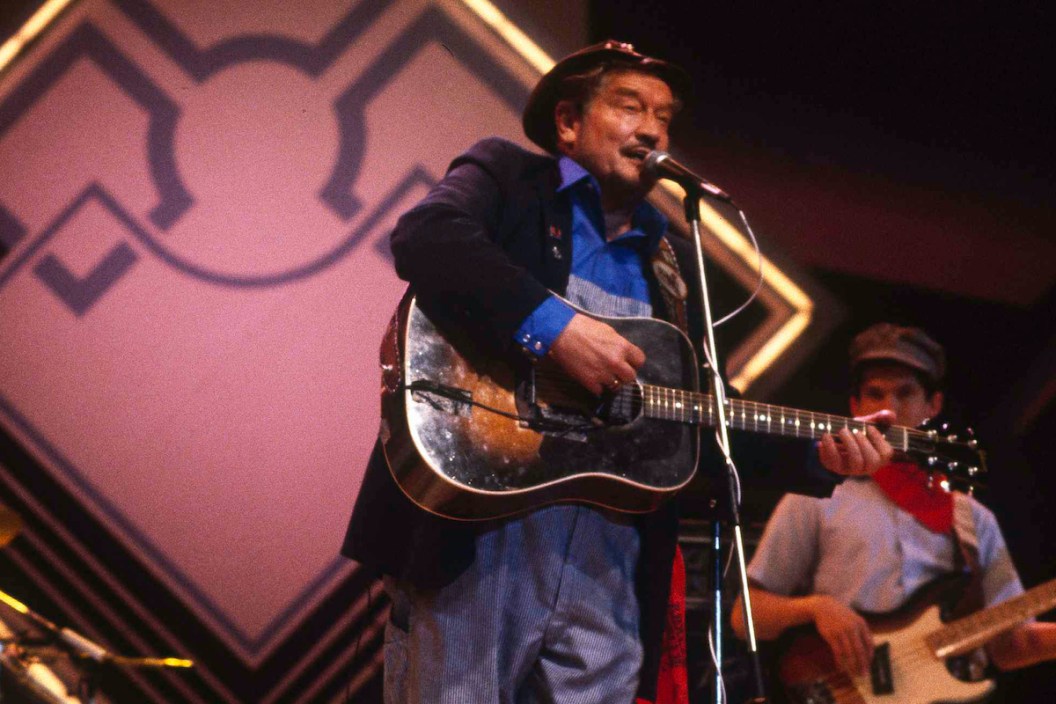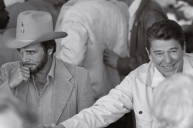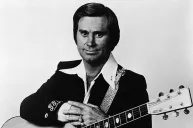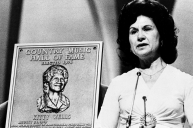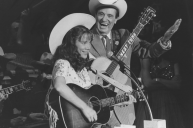Like Roy Acuff, Hank Williams, Patsy Cline, Willie Nelson and other legends, Boxcar Willie's name reminds fans of a certain age of watching classic country music singers on television or hearing them on radio shows. The latter's story is way different from the others, as his fame came later in life after adopting a railroad worker gimmick to carry on country music's rich tradition of train songs.
Videos by Wide Open Country
The future Boxcar Willie was born Lecil Travis Martin on Sept. 1, 1931, in Sterrett, Texas. Like Jimmie Rodgers before him, Martin really did grow up around trains. As a farm and section hand for the railroad, Martin's father was given a three-room shed as a home for his family.
As a young man, Martin engineered fighter jets instead of freight trains. He served in the US Air Force from 1949-1976, balancing duty to country and service in the Korean War with a budding interest in performing music under the name Marty Martin.
While stationed in Lincoln, Nebraska, Martin spotted a hobo riding a boxcar who happened to resemble his chief boom operator, Willie Wilson. The doppelganger inspired the song "Boxcar Willie," a composition that'd eventually fuel Martin's big career break.
After years as a band member and local television performer, Martin tried his hand at a talent show in San Jose, California. He won the $150 grand prize by performing for the first time as the old-time hobo character Boxcar Willie.
A music career followed, highlighted by a string of hits in the '70s and '80s. a perfect storm of talent and timing fueled his success. As country music went pop, Boxcar Willie represented the past for a fan base interested in drinking from the same trough that made stories about trains and songs about faith synonymous with American roots music.
The Antithesis of Grand Ole Opry Glitz
Decked out in overalls and a floppy hat as if he came to the show directly from the rail yard, Boxcar Willie never looked the same as the average country star.
By the time Boxcar Willie left the Air Force to pursue music full-time in 1976, fancy Nudie suits and custom cowboy hats had long defined the looks of male country stars and songwriters. Standing out in Nashville required not looking flashy, a notion that fueled the workman-like appearance of Waylon Jennings and others. While outlaws looked like they'd just repaired your motorcycle, Martin's alter-ego was more like a grandfather figure, uninterested in modern trends. Both the rebellious outlaw and elderly in-law approaches to stage outfits seem like calculated moves to profit off straying from the norm, building on Andy Warhol's command to "think rich, look poor."
This look and image made for a ready-made television character. Much of Boxcar Willie's early notoriety came from a Gong Show appearance and roles in television commercials for LP compilations, namely the multi-platinum album King of the Road. Like Jim Varney's Ernest P. Worrell, Boxcar Willie proved to be more than just a lovable redneck stereotype once his "Silver-Haired Daddy" character's screen or stage time went beyond brief commercial spots.
America's Favorite Hobo
Despite staking his claim at stardom through covers of "Wabash Cannonball" and other classic train songs, Boxcar Willie's back catalog paints the character and the man behind it as more than a railroad enthusiast. The underrated vocalist and song interpreter's cover selection and original songs also capture his deep Christian faith and family values ("Last Train to Heaven," "Spirit of America").
What kept him on the road well into the 1980s was a stage show that often relied on humor. Boxcar Willie's "Train Medley" and other songs often incorporated his spot-on impersonation of a train whistle. The Hee Haw regular impersonated humans, too, with his arsenal of country singer imitations ranking second only to Merle Haggard's.
Read More: 10 Things You Didn't Know About 'Sweet Dreams' Singer Patsy Cline
A Branson Trailblazer
In 1985, Boxcar Willie sought a break from non-stop touring by moving wife Lloene and family to Branson, Missouri. There, he set up shop at the Boxcar Willie Theater, near a similar facility that hosted Roy Clark's live show. Along with Clark, Boxcar Willie popularized live country music in a city that has since become a family-friendly alternative to Las Vegas. He eventually helped Tony Orlando and other world-renown pop stars find their way around Branson, making him an unofficial booster for the city's growing music scene.
Willie built a loyal audience outside of the United States, as well, with his career highlights including a chance to perform at Wembley Stadium.
From there, Boxcar Willie enjoyed legendary status as a performer, continuing his shifts as a singing brakeman until passing away in 1999 after a bout with leukemia.
This post was originally published on March 20, 2018.
Now Watch: Remembering Songwriter John Prine's Best Compositions Through the Years
https://rumble.com/embed/u7gve.v6i81x/
